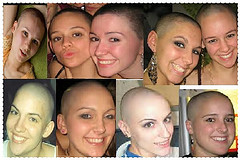
 Everyone says you look great in your wig. Or your scarf. Or that adorable peach fuzz. But maybe you don’t feel so great.
Everyone says you look great in your wig. Or your scarf. Or that adorable peach fuzz. But maybe you don’t feel so great.
“I noticed that when neighbors stopped in…I would forget I was naked on top and start conversing,” says survivor Michele Corey. “It wouldn’t be until I saw their eyes talking to my forehead that I remembered I was bald and wanted to run in and get something to cover myself.”
Baldness can be one of the most emotionally difficult cancer-treatment side effects to deal with. According to research published in Patient Education and Counseling (Issue 3), “Chemotherapy-induced alopecia is one of the most distressing side effects of chemotherapy.”
“It can be painful to look in the mirror and see someone you’re not,” says “About” writer Dave Alexander. “The baldness is a constant reminder of the disease, so it can be a real hurdle to overcome.”
You can cover it up. There are wigs, scarves, and hats. And of course, the promise that the hair will grow back. For most people, it does. According to chemocare.com, “In almost all cases of chemotherapy-induced hair loss, your hair will resume growth after treatments.”
Meanwhile, how do you cope? Men may have more role models to look up to-Vin Diesel, Chris Daughtry, and several other powerful, successful guys who choose to go hairless. Still, being bald has its challenges for men.
“I guess I had forgotten or maybe never realized just how important hair is to a lot of women,” says a troubled divorcee. “One woman told me that I have everything she’s looking for in a man except hair. I was stunned.”
For women, the challenge can be even tougher. “I could have been having a perfectly lovely day feeling utterly healthy,” says survivor Jane Read Martin, “and then, oops! I’d catch a glimpse of my bald head and be reminded that, Oh yeah, I have cancer!”
There are all the standard recommendations-join a support group, talk to a good friend, see a counselor, remember it’s not your fault, and remind yourself that it’s not forever. But when it comes right down to it, coping with your baldness means coming face-to-face with your own self image, and finding that it may need some attention.
“So much of a woman’s identity is tied to how she looks,” says Kim Lynch, R.N., breast health care coordinator at Mid Coast Hospital in Brunswick, Main. “It’s important to acknowledge your hurt and pain [about the changes in your appearance]. It’s real. But once you’ve accepted it, you can move on. Through this process, many women…realize what’s really important and reorder their priorities. Women discover their beauty from the inside out.”
In fact, a study in Cancer Nursing found that most cancer patients felt that physical characteristics became less important as measures of worth, while living itself became more important. “How do you reconcile the newly reassembled view of yourself?” write authors Sheri Magee and Kathy Salzo in Picking Up the Pieces. “As a survivor you must re-own your body-both how you see it and how you imagine others perceive it. Though the process may be fraught with self-doubt and avoidance, with frustration and discomfort, it remains an inevitable and important part of recovery. You are left with this home for your soul: learning to accept it, move into it, and get comfortable with it again are important steps in how you will progress.”
Did you experience changes to your self image as a result of hair loss? Please share your story.
Photo courtesy baldproducts via Flickr.com.

